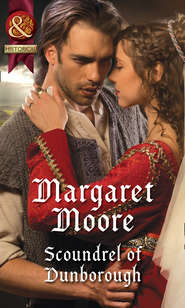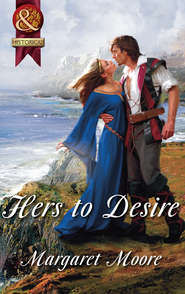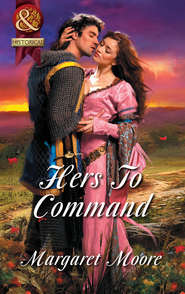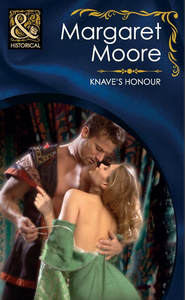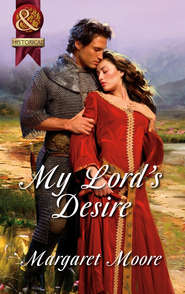По всем вопросам обращайтесь на: info@litportal.ru
(©) 2003-2025.
✖
The Overlord's Bride
Настройки чтения
Размер шрифта
Высота строк
Поля
“I promise I shall be a very humble and dutiful bride, Uncle,” she vowed, determined to do almost anything rather than return to the convent. “The Reverend Mother was very diligent in her efforts to make me humble and dutiful.”
“I do not think she succeeded very well.”
“She taught me how to look and act humble and dutiful when it is necessary,” Elizabeth clarified.
“I wish you would act that way with me.”
She gave her uncle a sincere smile. “I have been myself with you, Uncle. Isn’t that better?”
“No!”
His harsh response stung her, but she had learned well how to mask her hurt feelings, too. “How old is Lord Kirkheathe?”
“That doesn’t matter either.”
“If he is not young, you might want to remember that I could be his widow one day, Uncle. A very rich widow, in charge of a great estate.”
Again she hit the target and when he looked at her, there was a hint of grudging respect. “He is, I think, eight and thirty—but you might have a son of age to inherit before he dies.”
“I hope we have many sons, and daughters, too. Has he other children?”
“No.”
“Has he been married before?”
Her uncle’s face reddened as he craned his head to look up at the gray sky. “Enough questions! I think it is going to rain. We had best make haste.”
He called an order to the leader of his men, and in the next instant, they were trotting toward the village, and the forbidding castle beyond.
Absently scratching the large head of his hound, Raymond D’Estienne, Lord Kirkheathe, sat upon the chair on the dais in his great hall like a king upon his throne. Around him, a bevy of servants stood waiting, too, tense and expectant, glancing at their lord, each other, or the door to the kitchen. Not a one of them dared to speak, or else they would be looked at by Lord Kirkheathe.
His notice was something they all wished to avoid.
Outside, rain splashed against the thick walls of Donhallow Castle, heavy enough to be audible above the fire crackling in the hearth nearby.
The wedding party was late. Perronet and his niece—and his bride—should have been here hours ago, Raymond thought with annoyance.
Perhaps something had delayed them yet again. He had been receiving messengers from Perronet for days, all bearing excuses for his tardiness.
If the man and his niece didn’t arrive today, that would be the end of it. He was not a beggar or a fish to be kept dangling on a line. To be sure, he needed the money promised for the girl’s dowry, but he could find another bride now that he had finally decided the time had come to marry again. As for the personal attributes of the woman herself, they were far less important than the money she would bring. For the past several years, Raymond had been trying to maintain his castle on the income from his estate, but Donhallow was ancient and in need of more repairs than he could afford without additional income. Rather than let it fall down around him, he would marry.
He also needed a marital alliance, lest his enemy garner more support than he at both the king’s court, and that of their common overlord, the earl of Chesney. Perronet and his friends could provide such support.
Raymond’s hands balled into fists as they always did when he thought of Fane Montross, his neighbor and enemy.
A cry went up from the wall walk and all the servants glanced nervously at their lord, who made no move at all.
As they had kept him waiting, he would wait here for them. He would not go out in the rain to bid them welcome.
The door to the hall banged open and Barden, the commander of the garrison, marched to a halt, water dripping from his cloak and helmet. “Lord Perronet and his party have come, my lord,” he announced.
Raymond inclined his head, and still did not move. Let them understand that he was angry.
Barden, who had begun his career as a foot soldier here, knew better than to wait for more of a response. With the brisk military efficiency he had always possessed, he turned on his heel and departed.
The door opened again a few moments later, and the familiar figure of Lord Perronet hurried into the hall. Behind him, likewise swathed in a dripping cloak, was a woman. The bride, no doubt.
As Raymond watched without any alteration of his expression, Lord Perronet approached and bowed, one wary eye on Raymond’s dog, Cadmus. “Forgive us the delay, my lord. The weather has been most unseasonable, as you are no doubt aware, and we had trouble with a lame horse. I cannot possibly say how pleased I am that we have arrived safe at last.”
He made a hopeful smile, which did absolutely nothing to appease Raymond; nevertheless, he finally rose and bowed in response.
“Allow me to present my niece, my lord,” Perronet said, turning and gesturing for the woman to come forward.
She did, walking neither slowly nor quickly, and as she did, she raised her arms and pushed back the hood of her soaking gray wool cloak.
Perronet had claimed his niece was a great beauty. Raymond had believed that to be a lie, or an exaggeration, something meant to increase the bride’s value.
Surprisingly, it was true.
Her slender face was surrounded by the severity of a wimple, but that only seemed to emphasize her lovely features. Large, brown eyes crowned with shapely brows shone in the torchlight. Her nose was perfect, mercifully different from her uncle’s, and her cheeks looked as soft as velvet. Then there were her lips, rosy and full, the bottom slightly more than the top. Lips made for kissing.
Pure, raw desire, a sensation last felt so long ago as to be nearly forgotten, hit Raymond, as strong as the blow of an enemy’s fist. A need suddenly burned in his blood and sent it throbbing through his body, reminding him of the emptiness of his days. And nights.
Even as these sensations sprang to life, Raymond told himself they were feelings he did not want. The yearning coursing through him was but a weakness—a weakness he had fallen prey to once, and never would again.
The woman came to a halt beside her uncle. She glanced at Perronet, then turned her remarkably intelligent eyes back onto him. “I am Elizabeth Perronet.”
Her voice was as unexpected as her face, musical and very pleasant—and very determined. Yet it was not the unexpected nature of her voice that made Raymond frown.
He was supposed to wed Genevieve Perronet.
“My lord,” Lord Perronet began placatingly after giving the woman a swift and censorious look. “This is my other niece. Genevieve has, um, unfortunately proved herself unworthy of your lordship and the honor of being your bride. Elizabeth, however, is equally suitable—and of course, the dowry remains the same.”
Whatever was going on, Raymond realized, they didn’t need an audience. They could discuss it in the privacy of the solar. He gestured for Cadmus to stay, then looked pointedly at Lord Perronet before turning toward the tower that held his solar.
The man spoke quietly to his niece. “Wait here. I shall settle this accordingly.”
“No, Uncle,” she replied, making no effort to speak softly. “This concerns me, so I should be a party to the discussion. I am not a piece of furniture or a block of wood.”
“Elizabeth,” Perronet warned.
Raymond raised an eyebrow. Lord Perronet instantly started toward him, trailed by his niece.
A bold woman. Was that good—or bad? Allicia had not been bold, not until the last night of her life.
Raymond again started toward the solar and heard them follow.
“Is he mute?” Elizabeth Perronet whispered as they climbed the tower stairs.






